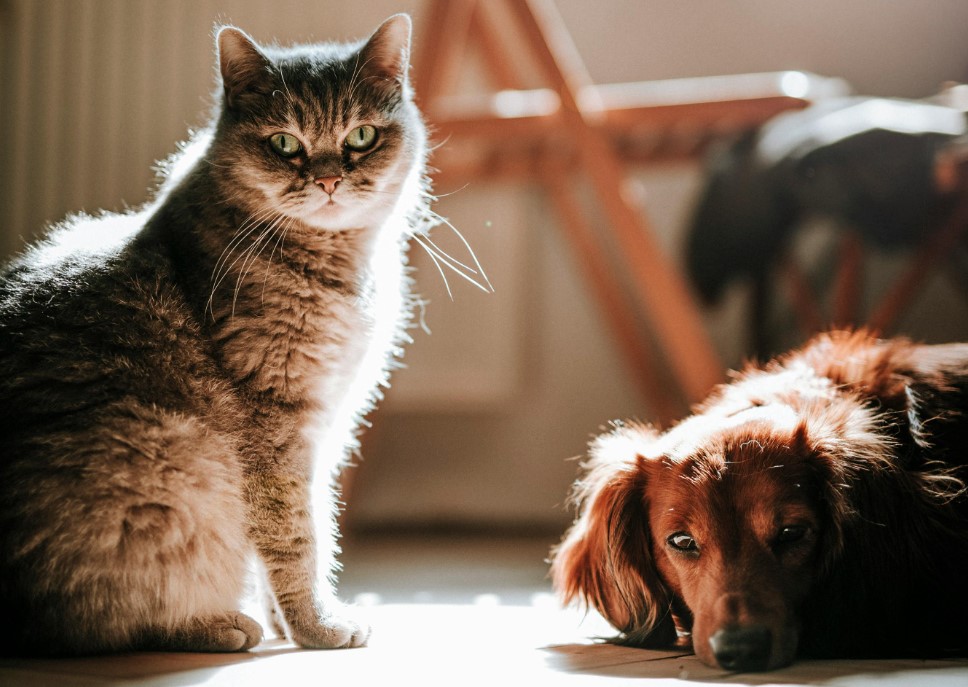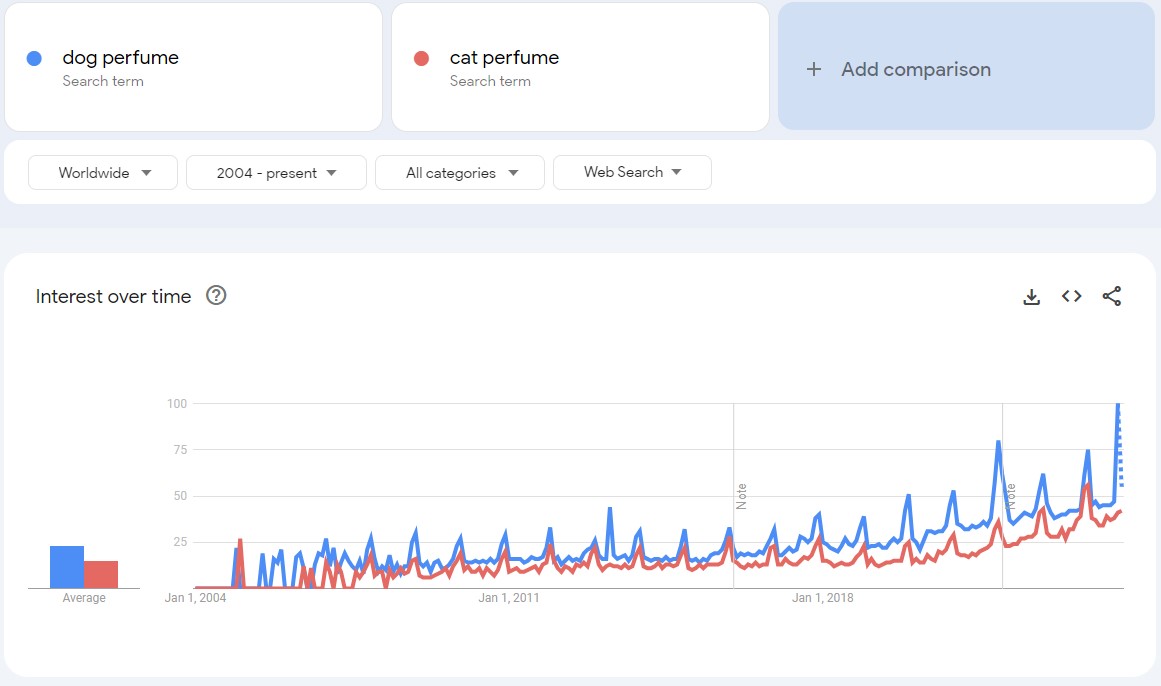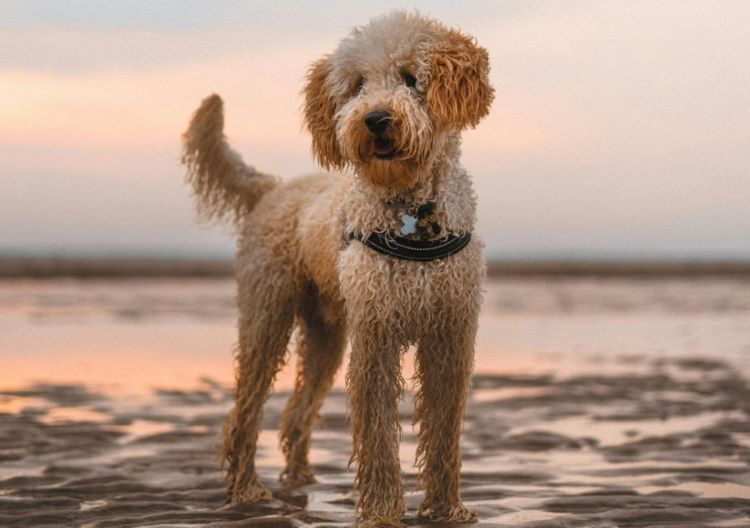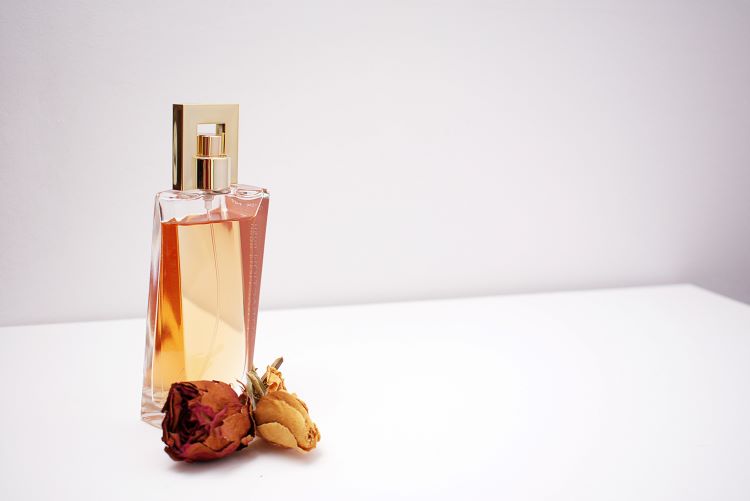Ready to help treat your pet to a healthy life?
Can You Spray Perfume on Your Pet? Safety Tips for Dog and Cat Fragrances
By : Brianna Gunter | Published Sep 24, 2024

It’s a simple fact of life that pets can sometimes be pretty smelly. As wonderful as our canine friends are, they have a tendency to roll in things and dislike bathing. And even though cats are famously clean creatures, they too tend to have different definitions of what’s acceptable to the nostrils. What’s a pet parent to do?
Since most of us want to enjoy our pal’s company without holding our breath, it’s no wonder pet perfumes have gained traction over the years. Just look at how online searches for “dog perfume” and “cat perfume” have grown over the past two decades!

Screenshot of search trend data from Google Trends
But are these pet perfumes actually safe for our furry friends, and are they even effective? Before you start shopping, it’s important to know what you’re getting into. It’s also worth noting upfront that many veterinarians do not recommend perfumes for dogs or cats, for some very good reasons.
Ready to dive nose-first into the world of pet aromas? Let’s go!
Pet perfume safety concerns
As we just mentioned, vets generally do not recommend using fragrances on pets. This includes those that are advertised as “pet-safe” or designed specifically for dogs or cats.
“In my opinion a healthy cat or dog doesn’t really have a smell, aside from the distinctive puppy and kitten breath, and who can refuse that?” says Trupanion veterinarian Dr. Sarah Nold. “Smells are often one of the things used on physical exam by a veterinarian to determine if there is an underlying illness to be concerned about.”
That’s right — if your pet is smelling unpleasant in the first place, it could indicate something is wrong. Even the best pet perfumes only cover odors temporarily and do not address underlying causes like poor hygiene, health issues, or an unclean living environment.
Of course, it can’t be stressed enough that regular grooming and bathing are essential for maintaining your pet's natural scent and hygiene. For cats, it’s especially important to use products specifically designed for them, as cats are sensitive to many fragrances and chemicals.
Keep in mind though that your pet’s sense of smell is much more acute than your own. Even though their natural odors may bother you from time to time, the scent of perfume — even a pet-safe fragrance — may be overwhelming for them. Using it can lead to confusion and stress, and they may act out in ways you do not like in an attempt to regain their sense of normalcy and territory. According to Nold, this is because the use of pet perfumes may affect pets’ marking behavior and sense of established hierarchy in the household.
Some pets may likewise be more sensitive than others, especially when things are applied topically to them. They may become sick if they accidentally inhale or ingest any of the fragrance.
“Another concern is that perfumes could trigger a flare-up of allergies or asthma, so pets with these underlying conditions should probably avoid [pet perfumes] altogether to be safe,” Nold says. “The same goes for if there are people in the household with these conditions.”

Pet odors as signs of illness
As we’ve established, not all dog and cat smells are simply a cause of their environment (like rolling in something foul).
“A bad smell may be an indication of an ear or skin infection that needs to be addressed,” says Nold. “Smelly urine may be a sign of a urinary tract infection or dysfunction of an internal organ. Some say that diarrhea caused by canine parvovirus smells different. A mouth with periodontal disease or stomatitis can smell horrible, especially if there is a hidden infected tooth or mass.”
So, if you do notice any questionable odors emanating from your pet, the last thing you should do is try to cover them up with a pet perfume. Seek veterinary attention if you notice any of the following signs:
- Bad breath, which could indicate dental issues
- The scent of ammonia
- Fruity-smelling breath
- Musty or stale odor (especially on your pet’s feet, as this could indicate a skin yeast infection)
- Skin that smells like corn chips
- A noticeably sweet, saccharine smell
- A putrid, rotting scent
- A fishy smell
- Smells caused by excessive gas
- Changes in odor that correspond with changes in fur or skin appearance
- Any significant change from how your pet normally smells
The good news is that, in a lot of cases, these odors could just be from something your pet rubbed up against. However, it’s important not to make assumptions. Many of the signs above are indicative of conditions like bacterial infections, which could spread and cause more serious problems for your pet. Give your vet a call right away if you’re unsure.
Do cat and dog perfumes work?
Obviously if you’re going to be spending money on any pet perfume, you want to be sure that it’s effective. Dog and cat perfumes are designed to mask pet odors and provide a pleasant scent for owners and their pets. In short: these products can work, but their effectiveness depends on various factors, including the quality of the ingredients, the specific needs of your pet, and how both you and they react to the scent. There are also various safety concerns you’ll have to consider (and reasons why most veterinarians do not recommend pet fragrances), which we’ll get to in just a moment.
Higher-quality pet perfumes are made with ingredients touted as being safe for pets. These include essential oils (though not all essential oils are safe for pets) and/or hypoallergenic components that won’t irritate the average pet's skin or nose. But, again, these can still be overwhelming for your pet’s senses and lead to unnecessary stress and potential behavioral issues. And, according to Nold, the amount of regulation on pet-safe perfumes is unclear.
“Any pet smell, especially a new one, should be evaluated by a veterinarian,” she says. “I would advise an owner should know they are proceeding at their own risk. ‘Pet safe’ feels like it should offer some reassurances but is no guarantee that the product is truly safe.”
5 healthy alternatives to pet perfumes
Because of the risks, you may want to ditch dog and cat fragrances altogether. As Nold puts it, “I think it is safe to say most veterinarians would not recommend pet perfumes.”
Fortunately, there are other things you can do to address your pet’s odors and maintain natural cleanliness. Here are some effective options that don’t rely on artificial fragrances.
1. Regular grooming
Brushing your dog or cat daily helps remove dirt, dead skin, and loose fur, reducing odor. Grooming also distributes natural oils, which contribute to a healthy coat and skin.
2. Bathing with pet-safe shampoo
Use a mild, pet-safe shampoo designed for sensitive skin. Oatmeal-based or hypoallergenic shampoos are great options for keeping pets clean without using harsh chemicals or artificial fragrances.
3. Apple cider vinegar rinse
A diluted apple cider vinegar rinse (1 part vinegar to 3 parts water) can help neutralize odors, balance skin pH, and condition the coat naturally. Be sure to avoid the face and sensitive areas, and, again, always dilute!
4. Regular cleaning of pet items
Frequently washing your pet’s bedding, toys, and living areas eliminates sources of bad odors and keeps your pet’s environment fresh. Always use pet-safe cleaning products for this, naturally.
5. Proper diet
A balanced, high-quality diet supports overall health and can reduce odors caused by poor digestion or skin issues.

What about human perfumes on pets?
If you don’t have any pet-safe fragrances on hand, it can be tempting to quell your pal’s questionable aromas with a human perfume. But before you do that, know that the ingredients in perfumes meant for people may not be safe for pets.
There are more than a few things to be concerned about here, but phthalates are the main offender. Now known to have detrimental effects on human health as well, phthalates are colorless, odorless chemicals typically used as solvents and stabilizers in fragrances. Even when not included in the liquid ingredients, these chemicals are often still found in the packaging of most commercially sold perfumes and other personal care products. Inhaling phthalates can be harmful, but pets are at even higher risk of ill effects because they’re more inclined to lick perfumes off their fur and skin.
In recent years, there have been more phthalate-free and “non-toxic” fragrances on the market to combat this. However, these may still contain other harmful ingredients like parabens, carcinogens, or even unsuspected animal by-products. And even without these they may also include certain essential oils or other ingredients that are unsafe for dogs and cats. The lesson here? It’s always best to avoid using any human perfume on pets, regardless of how nice it smells or how “safe” it appears.
In the meantime, protect your pet against unexpected health conditions with a good pet insurance plan.
